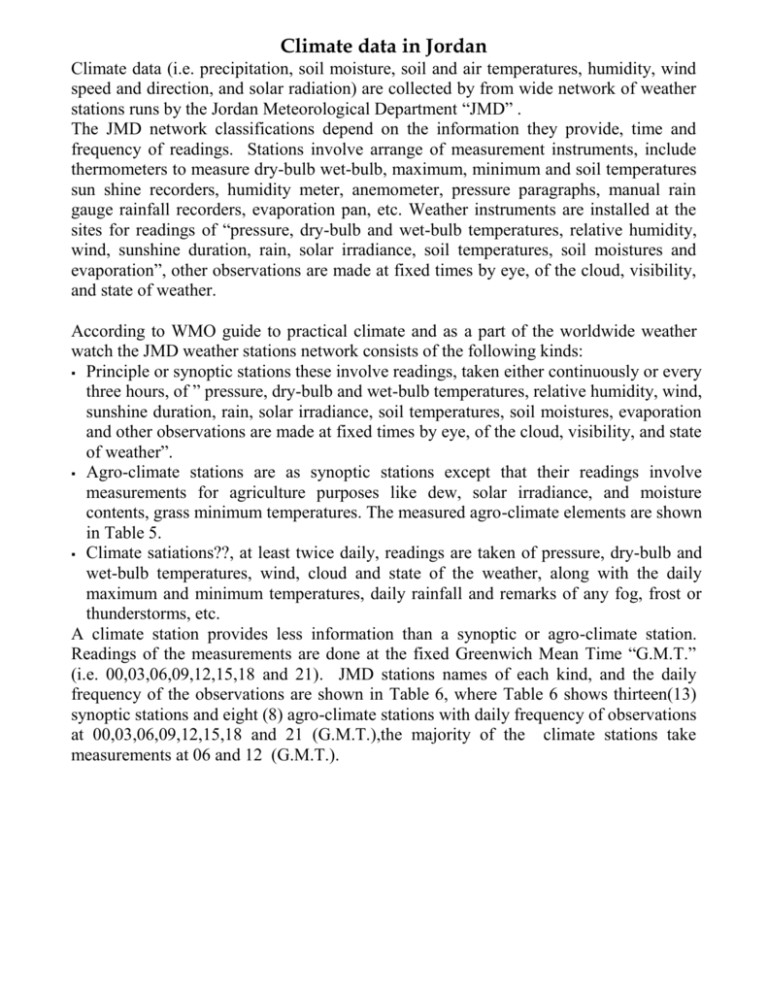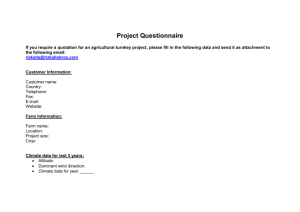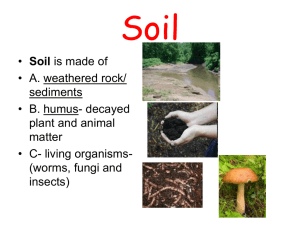National Climate Monitoring Products for Jordan
advertisement

Climate data in Jordan Climate data (i.e. precipitation, soil moisture, soil and air temperatures, humidity, wind speed and direction, and solar radiation) are collected by from wide network of weather stations runs by the Jordan Meteorological Department “JMD” . The JMD network classifications depend on the information they provide, time and frequency of readings. Stations involve arrange of measurement instruments, include thermometers to measure dry-bulb wet-bulb, maximum, minimum and soil temperatures sun shine recorders, humidity meter, anemometer, pressure paragraphs, manual rain gauge rainfall recorders, evaporation pan, etc. Weather instruments are installed at the sites for readings of “pressure, dry-bulb and wet-bulb temperatures, relative humidity, wind, sunshine duration, rain, solar irradiance, soil temperatures, soil moistures and evaporation”, other observations are made at fixed times by eye, of the cloud, visibility, and state of weather. According to WMO guide to practical climate and as a part of the worldwide weather watch the JMD weather stations network consists of the following kinds: Principle or synoptic stations these involve readings, taken either continuously or every three hours, of ” pressure, dry-bulb and wet-bulb temperatures, relative humidity, wind, sunshine duration, rain, solar irradiance, soil temperatures, soil moistures, evaporation and other observations are made at fixed times by eye, of the cloud, visibility, and state of weather”. Agro-climate stations are as synoptic stations except that their readings involve measurements for agriculture purposes like dew, solar irradiance, and moisture contents, grass minimum temperatures. The measured agro-climate elements are shown in Table 5. Climate satiations??, at least twice daily, readings are taken of pressure, dry-bulb and wet-bulb temperatures, wind, cloud and state of the weather, along with the daily maximum and minimum temperatures, daily rainfall and remarks of any fog, frost or thunderstorms, etc. A climate station provides less information than a synoptic or agro-climate station. Readings of the measurements are done at the fixed Greenwich Mean Time “G.M.T.” (i.e. 00,03,06,09,12,15,18 and 21). JMD stations names of each kind, and the daily frequency of the observations are shown in Table 6, where Table 6 shows thirteen(13) synoptic stations and eight (8) agro-climate stations with daily frequency of observations at 00,03,06,09,12,15,18 and 21 (G.M.T.),the majority of the climate stations take measurements at 06 and 12 (G.M.T.). Table 5 Agro-climate elements measured, derived and stored in JMD ago-climate database in the Agro-Climate Data Elements 10 Day Daily Maximum Temperature °C, 10 Day Mean Temperature Daily Maximum Minimum Temperature °C, 10 Day Mean Precipitation, 10 Day total 'mm' Potential Evapotranspiration,mm/day, 10 Day Total Solar Radiation Cal/cm², 10 Day Mean Terrestrial Radiation Cal/Cm²/day, 10 Day Mean Net Radiation Cal/Cm²/day, 10 Day Mean Maximum Relative Humidity%,10 Day mean Minimum Relative Humidity%, 10 Day mean Mean Relative Humidity (MAX+MIN)/2 %, 10 Day Mean Vapoure Pressure 'mb', 10 day mean Saturation Deficit 'mb',10 day Evaporation Pan 'mm/day', 10 Day Total Potential Evapotranspiration Pan 'mm/day' SUBZERO Temperature hours, 10 Day Sum Cooling hours (0.1 to 7°C), 10 Day Sum Growing degree days 7.1°C, 10 Day Total Growing degree days 5°C, 10 Day Total Growing Degree days 10°C, 10 Day Total Growing Degree Days 12.5°C, 10 Day Total Growing Degree Days 15°C, 10 Day Total Days number with Maximum Temperature >35°C Days Number With Minimum Temp. 5 to 9°C, 10day sum Days Number With Minimum Temp. 0.1 to 4.9°C,10 day Days number with minimum Temp.-4.9 to 0°C, 10day Days number with minimum Temp. <=-5°C, 10 day sum Days number with grass minimum Temp.<=0°,10 day Days number with Precipitation >=0.1 mm, 10 Day Days number with daily mean R.humidity>=70%,10 day Days number with daily mean R.humidity<=40%,10 day Highest Maximum Temperature °C Lowest Minimum Temperature°C Highest Rainfall amount in 24 hrs "mm" Wind Run km/day, 10 Day Mean Temperature Grass Min.at 5cm, 10 Day Soil Temperature°C , 10 Day mean at 1cm Soil Temperature°C, 10 Day Mean at5cm Soil Temperature°C, 10 Day Mean at10cm Soil Temperature°C, 10 Day Mean at 20cm Soil Temperature°C, 10 Day Mean at 50cm Soil Temperature°C, 10 Day Mean at1m Sunshine "hrs", 10 day Daylight hours, 10 Day Mean Temperature Daily Minimum °C Temperature Daily mean °C Precipitation total daily 'mm' Potential Evapotranspiration (ET) mm/day Solar Radiation Cal/cm²/day Terrestrial Radiation Cal/Cm²/day Net Radiation Cal/Cm²/day Relative Humidity Daily Maximum % Relative Humidity Daily Minimum % Relative Humidity Daily, Mean (MAX+MIN)/2,% Vapoure Pressure 'mb' Saturation Deficit 'mb' Evaporation Pan daily Total, mm/day Potential Evapotranspiratio Pan mm/day,daily total Soil Temperature C° daily AVG at1cm(00+06+12+18)/4 Soil Temperature C° daily Mean /4 at 5cm Soil Temperature C° daily Mean /4 at 10 cm Soil Temperature C° daily Mean /4 at 20 cm Soil Temperature C° daily Mean /4 at 50 cm Soil Temperature C° daily Mean /4 at 100 cm SUBZERO Temperature hours Cooling hours 0.1 to 7°C Growing degree days 7.1°C Growing degree days 5°C, Daily total Growing degree days 10°C Growing degree days 12.5°C Growing degree days 15°C Wind Run Daily Total, km/day Temperature Grass Min.at 5cm Sunshine Daily total "hrs" Available Data and Databases Climate and Agro-climate databases at JMD Climate and agro-climate are available in digital format from an oracle database; the size of the database is more than 700MB. It is comprehensive and contains stored data on all climate and agro-climate parameters in Jordan that spans from 922 to the current day. The database contains data for hourly, daily and monthly climate data here is a description of those type of data collected and stored in the climate database. The climate and agro-climate database contains more than 35 tables. Names of the tables, fields of the database are shown in Figure 14, the main tables which contains the data are; DLY_DATA, H_DLY_DATA and MONTHLY_DATA For Hourly data, each station has a unique identification number which is stored in tables in the database, also stored for each station the location coordinates, element code, date of measurements (year, month, day) and value of the measurements. This data is collected throughout the year on a monthly basis and is stored accordingly; it is also in digital form and can be extracted and used for analysis. The four (4) hourly data at 00,06,12 and 18 G.M.T are the main primary data in the climate and agro-climate database, measurements which taken at the intermediates time 03,09,15 and 21 G.M.T still not computerized and archived in paper forms. Daily data is the data taken from measurements one time every 24hour such as, maximum and minimum temperature, evaporation and rainfall at specified time for each parameter. Also each station in this table has unique identification number, element code, date (year, month, day) and value of the measurements. The DLY_DATA, H_DLY_DATA and MONTHLY_DATA are joined with other tables to derive other information’s including meta-data, date of extreme element, etc. The JMD Database Contains data tables needed for: o Information system (Site, Definition, Instrument, User Privilege). o Metadata (Station info., Station Instrument, Elements, Station Elements, Station location Update). o Data Entry (Upper Air, Daily, Synoptic). o View Climate Data (Daily element extreme, Synoptic element extreme, Monthly Data, Daily Data, Synoptic data) Details Information in what those tables contain are shown in Annex II. Reporting or output (Climate data, Metadata, Normal’s) Rainfall intensity Data for selected stations through open date has been digitized and exists in digital format from Access and Oracle databases. JCDMS application “Jordan Climate Data Management System “based on Oracle developed by Jordan Meteorological Service-Climate Division, has the capability to import and export climate data in digital format and also has the capability to generate other climate and agro -climate information. “JCDMS Data Management System Reference Manual”, gives full details on how to use the JCDMS application for data entry, data retrieve and generated reports. Modification can easily be done for any request of climate data through new SQL statements. A variety of agro-climate elements from the agro-climate database on basis of daily and 10days can be printed out or exported in digital format. Table 9 shows the agro-climate elements available from the agro-climate stations for the period indicated under each station. Daily rainfall and Rainfall intensity data are available in digital format, more than 50,000-rainfall strip chart has been digitized Using RAINDIGITIZER software. Data distributed upon request to customers and various sectors on hourly, daily basis, every 10 days and at the end of each month. Daily precipitation amounts, daily maximum and daily minimum temperatures at 46 stations from JMD climate database were available in digital format for: Every 6 hours, Daily, 10 days, Monthly averages and Long term of monthly means ” Normal’s” observations. Table 9 The agro-climate elements available in the agro-climate database Agro-climate Stations Station Baqura Deir Alla Ghor Safi Irbid Wadi Dhulall Rabba Period 196819531975195519681955The agro-climate elements available from the database Minimum Temperature °C, 10 Day Mean Maximum Temperature °C, 10 Day Mean Grass Minimum Temperature °C, 10 Day Mean Evaporation Class "A" Pan mm/day, 10 Day Total Precipitation "mm", 10 Day Total Sunshine Duration hours, 10 Day Mean Solar Radition cal/cm²/day, 10 Day Mean Net Terrestrial Radition cal/cm²/day, 10 Day Mean Net Radiation Cal/cm²/day, 10 Day Mean Wind Run km/day, 10 Day Mean Growing Degree Days, Threshold Temperature 5°C, 10 Day Total Growing Degree Days, Threshold Temperature 7.1°C, 10 Day Total Growing Degree Days, Threshold Temperature 10°C, 10 Day Total Growing Degree Days, Threshold Temperature 12.5°C, 10 Day Total Agro-climate Stations Station Baqura Ghor Safi Irbid Wadi Dhulall Rabba Period 19771977197719771977The agro-climate elements available from the database Reference Crop Evapotranspiration Class "A" Pan mm/day, 10 Day Total Reference Crop Evapotranspiration mm/day, 10 Day Total Maximum Relative Humidity %, 10 Day Mean Minimum Relative Humidity %, 10 Day Mean Vapoure Pressure 'mb', 10 day mean Saturation Deficit 'mb',10 day Days Number With Relative Humidity <40% , 10 Day Mean Days Number with Relative Humidity >70% , 10 Day Mean Agro-climate Stations Station Deir Alla Ghor Safi Irbid Wadi Dhulall Rabba Period 19861986198619861986The agro-climate elements available from the database Sub-zero hours, 10 Day Total Cooling hours, 10 Day Total (temperature 0.1 - 7 °C) Shoubak 1961- Shoubak 1977- Shoubak 1986- Climate monitoring products in Jordan 1. 2. 3. 4. 5. 6. Jordan Climate Monthly summaries Annual Reports Special Reports Temperature and Precipitation Maps Interpolate “grided (ideally 10 by 10 minutes)” monthly data





